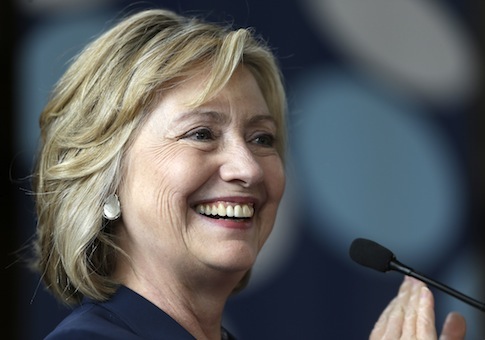Recent news that NBC, which is owned by the Comcast corporation, will produce a four-hour miniseries on the career of former senator, First Lady, and Secretary of State Hillary Rodham Clinton has thrown new light on the communication giant's long record of support for Democratic politicians and candidates.
David Cohen, Comcast’s executive vice president, raised more than $1.4 million for President Obama’s reelection effort. He also hosted a fundraiser for the president at his Philadelphia home.
The fundraiser reportedly brought in at least $120,000 for the campaign. Comcast employees chipped in another $135,000 to reelect the president, according to the Center for Responsive Politics.
They also have donated $124,000 to Clinton’s prior senatorial and presidential runs.
The announcement of the miniseries has sparked criticism from some who say any film is likely to be friendly to Clinton, who is widely expected to run for president in 2016.
"I expect [NBC’s biopic] to cast her as a heroic, pioneering figure," said Tim Graham, director of media analysis at the Media Research Center.
NBC and its cable arm MSNBC have been criticized for leftward political leanings for some time. Shareholders of Comcast, the cable giant that owns NBC, pressed the company on its political slant at a May shareholder meeting.
MSNBC personalities, including the controversial Rev. Al Sharpton, have enjoyed high levels of access to President Barack Obama and several former members of the president's administration have joined the network as paid contributors.
NBC is not the only media company working on a Clinton biopic, however. CNN announced on Monday that it will produce its own documentary. Another film on Clinton, produced by the Arlook Group and Temple Hill Entertainment, is also in the works.
"The irony here is that the Citizens United [vs. FEC Supreme Court] case was spurred by the fact that David Bossie couldn't get [an anti-Hillary Clinton film] into theaters and was trying to place it on pay-per-view," Graham said.
That irony is not lost on David Bossie, president of Citizens United and executive producer of Hillary: The Movie.
"I fully support NBC’s efforts to make films on political leaders in America. I think it’s a fine thing to do. I just think it’s a fine thing for me to do too," Bossie told the Washington Free Beacon in an interview.
"It’s an interesting conundrum that the left is going to find themselves in," he said. "NBC doing this is potentially a huge favor for Citizens United. Whether we agree with the content or not, I believe in their right to do it."
Bossie, Graham, and others pointed out that five years after Citizens United, a conservative nonprofit group, was barred from airing its anti-Clinton documentary Hillary: The Movie, other corporations, some of which are tied to the Democratic Party, are bankrolling projects that likely will be friendlier to the Democratic superstar.
"I doubt that any of the liberal critics of the Citizens United decision will be out protesting that NBC has made a miniseries glorifying Hillary Clinton," said Hans von Spakovsky, a senior legal fellow at the Heritage Foundation and former Federal Election Commission attorney.
"That prior documentary violated the federal campaign finance laws that the Supreme Court found unconstitutional," von Spakovsky said. "But that case paved the way for NBC to make this miniseries, which is a thinly disguised attempt to help her in a 2016 presidential run."
Bradley Smith, a former FEC commissioner and law professor at Capital University School of Law, also noted that prior to Citizens United, laws governing electioneering communications included carve outs for media companies.
Smith said those carve outs speak to the legal problems with pre-Citizens United campaign finance laws and rhetorical objections to corporate political speech since the decision.
"Any system that attempts to censor some speakers, while giving others a favored position as ‘the press,’ necessarily requires a government agency to decide who is in the privileged class and who is not," Smith explained. "That looks a lot like a press licensing board."
"Moreover," he added, "as the technology spreads allowing for live webcasts to take the place of radio, for blogs to complement newspapers (and for newspapers to start blogs), for self-published books to bypass traditional publishers, and for inexpensive movies to be made at home or in small studios and distributed cheaply on DVDs or through YouTube or other online sites, government selection of who gets to speak will become more and more arbitrary and, therefore, more and more political."
